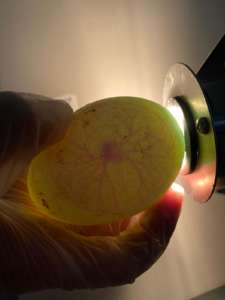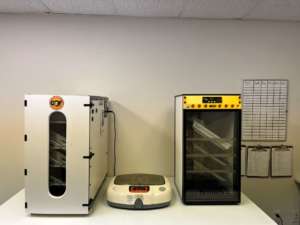Bird Breeding Season: Eggs
Hello again everyone! Lauren Wilson here to tell you more about the ins and outs that go into the Bird Department’s breeding season here at Zoo Atlanta. In my last blog, we discussed everything about nests, including nest types, nest materials, and what the Bird Team does to ensure each species of bird has what they need to build appropriate nests. Now we’re going to discuss the whole point in building nests…laying eggs!
Eggs are absolutely amazing! Think about it…once an animal lays an egg, that egg has everything the developing embryo needs to survive from the time it is laid to the time that it hatches. And, although many different types of animals lay eggs, birds are unique in that they lay hard-shelled eggs. They are stronger than soft-shelled eggs and can support the developing embryo through harsher conditions like arid environments or rolling out of a nest. Birds also produce eggs in a variety of shapes, sizes, and especially colors based on the species that lays them, the nests they build, and the camouflage they need to protect them from predators. So, without going too much into the biology of eggs, how do we manage eggs here at Zoo Atlanta? The short answer is very carefully (ha ha), but I’m going to give you the long answer because, just like nests, a lot of planning and effort goes into managing eggs.
The first step in managing eggs is deciding which birds should and should not breed in the Bird Department. I work with the Bird Management Team, which includes the Lead Keeper and Senior Curator of Birds, long before the breeding season begins to decide which species and which pairs of each species should breed each season. These decisions are based on Species Survival Plan® (SSP) recommendations, interest in the species from other zoos and aquariums, available habitat space, and the history of the individual birds.

The best and easiest situation is one in which the pair of birds has a history of building nests, laying eggs, and raising chicks successfully. The Bird Team simply lets the parents do their thing! We will monitor the nest via a camera or, if the pair is not prone to disturbance, physically every three or four days so that we know when the eggs are laid. Knowing when the eggs are laid is important because, based on each species’ egg incubation period, we will then know when we can expect chicks to hatch, which in turn will change our husbandry practices. But that is a topic for my next blog! We will also check the eggs at least once for fertility. We do this by candling the eggs. Candling is a technique where we shine a light into the egg to see the developing embryo. If an egg is fertile, we will see blood vessels first followed by the embryo in different stages of development. If the egg is infertile, we say it “lights up like a light bulb” because we will not see anything inside the egg but the light shining through it. You can see what I mean at home by shining a flashlight through a chicken egg! If the eggs are infertile, we may remove them from the nest, so the pair lays more eggs sooner and we have another chance at a successful clutch of chicks in the season.
Sometimes birds are great at building nests and laying fertile eggs, but not so great at incubating those eggs. Sometimes it is incredibly important for us to breed the species and we don’t want to risk, especially with new parents, them not incubating eggs successfully. In these cases, we may choose to incubate the eggs ourselves. When we chose to artificially incubate eggs, we remove the real eggs from the parents and replace them with fake or, as we call them, dummy eggs. The Bird Team makes all their own dummy eggs typically by hollowing out infertile eggs and filling them with plaster, so they are more durable. The parents will continue to “incubate” these dummy eggs and be ready to raise the chicks rather than beginning the process of laying eggs all over again.

Artificial incubation is advantageous because it allows us to monitor the developing embryos extremely closely. We use three incubators here at Zoo Atlanta. They are on a timer to rotate the eggs and are kept at the same temperature but are set to three different humidity levels. Every other day we weigh and candle each egg that is being artificially incubated. Why weigh them? All normally developing bird eggs, regardless of species, should lose between 14% – 16% of their weight from the time they are laid until the time they hatch. This is where the different humidity levels come in. Eggs are porous and essentially breathe through their shells. If an egg is projected to lose too much weight, we can move it into an incubator that has a higher humidity level to slow its weight loss. If an egg is projected to lose too little weight, we can move it into an incubator that has a lower humidity level to speed up its weight loss. And we candle them to ensure they are fertile, developing normally, and to know when they are about to hatch (again…the topic of my next blog!).
Over the years, a handful of individual birds have shown that they will not reproduce successfully and allowing them to lay eggs may be injurious. Let me explain. As a bird lays an egg, a certain amount of calcium must be deposited to make an eggshell hard enough for it to smoothly move through the bird’s reproductive tract and be laid successfully. If this process is faulty in any way, and not enough calcium is deposited on the egg, the eggshell will remain soft and the egg itself may become stuck inside the bird’s reproductive tract. We call this being egg-bound, and surgery is sometimes necessary to remove these eggs to prevent infection. For birds that chronically have this problem, we have been utilizing a hormonal implant that physically prevents the birds from producing eggs.
In other cases, individual birds may reproduce successfully but we may not want them to. Perhaps they are housed with their siblings or perhaps we do not have the habitat space to house offspring. We may want these individuals to reproduce in the future, so we let them experience building nests, laying eggs, and incubating eggs; we just don’t allow the eggs to hatch. As soon as the eggs are laid, we remove them from the parents to prevent them from developing and replace them with dummy eggs. At the end of their incubation period, we remove the dummy eggs, and the parents act as though their eggs simply didn’t hatch and prepare for another clutch of eggs.
As I’m sure you can tell, eggs are one of my favorite parts of working with birds! They are amazing biologically and, in knowing this biology, allow us to give every breeding pair of birds the opportunity to be reproductively successful. I hope you have gained an appreciation of the care and thought that goes into every egg that is laid by our birds here at Zoo Atlanta!
(Photos: Bird Team)
Lauren Wilson
Associate Curator of Birds

Connect With Your Wild Side #onlyzooatl